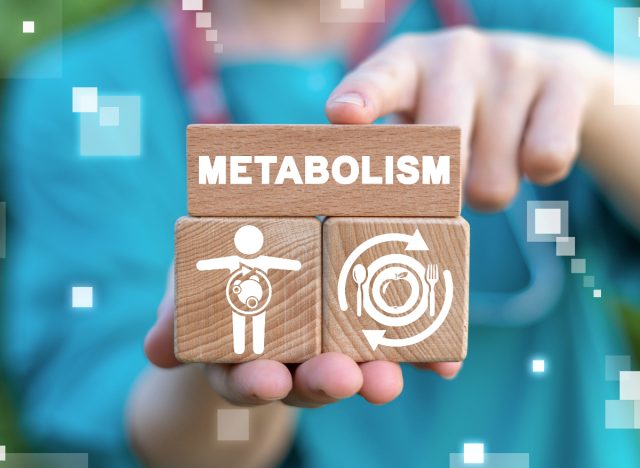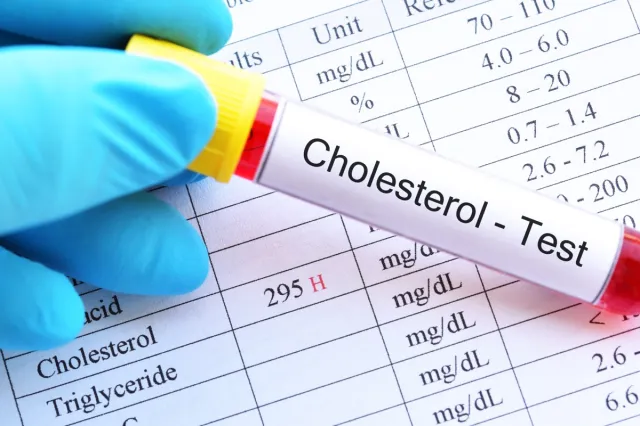What Happens to Your Body After You Lose 50 Pounds

Losing weight takes a tremendous amount of discipline—especially if you aim to lose 50 pounds or more. But dropping a significant number of pounds can bring on plenty of positive side effects, especially if you’re extremely overweight or obese.
While there are a handful of not-so-pleasant changes that go with it, the good outweighs the bad. So whether you’re about to embark on your 50-pound weight-loss journey or have already achieved your target weight, here are some major changes to prepare for. And if you need help getting there, check out our tips for how to lose 50 pounds or more.
You Sleep Better

Adam Freter, RD at the bariatrics program at Ohio State Wexner Medical Center, often hears patients share that their sleep improved post-surgery or weight loss. “As the weight comes down, they can breathe easier at night, and obviously the sleep quality improves,” he notes.
In fact, researchers from the University of Pennsylvania found that obese adults who had lost at least five percent of their body weight began sleeping an extra 22 minutes per night. What’s more, their overall sleep quality improved as a result of shedding that excess weight.
Your Mood Improves

The study on sleep quality reveals that mood also improved after substantial weight loss. It makes sense that once you start sleeping better, exercising more and (hopefully) eating better, your overall outlook will only become more positive.
Your Taste Buds Change

No, you’re not crazy—food does taste different once you’ve lost weight. In fact, researchers from Stanford University found that 87 percent of patients who had undergone bariatric surgery reported a change in taste.
The good news: These changes could help you lose more weight and keep it off. Nearly half of the patients who experienced a change in taste reported that foods weren’t as tasty, which caused them to eat less than before. As a result, they lost 20 percent more weight over three months compared to surgery patients who reported that foods tasted better.
Looking for more helpful tips? Be sure to sign up for our newsletter to get daily recipes and food news in your inbox!
Your Memory Sharpens

If you struggle to remember faces and names, weight loss may help you avoid awkward situations. Findings presented at The Endocrine Society’s Annual Meeting in 2013 reveal that older women were better able to memorize faces and names after following a six-month weight loss program. According to researchers, brain activity increased in the regions that aid with identification and matching, while activity decreased in the regions associated with episodic memory retrieval. The result: A more efficient process for storing and re-collecting new information.
“Our findings suggest that obesity-associated impairments in memory function are reversible, adding incentive for weight loss,” said study author Andreas Pettersson, MD, in a press release.
Your Sexual Health Gets a Boost

Both men and women may see their sexual health improve as you reach 50-pound weight loss A review in Canadian Family Physician, for example, reveals that 31 percent of obese men with erectile dysfunction were able to restore function after losing an average of 33 pounds. Similarly, a study in The Journal of Clinical Endocrinology & Metabolism found that obese women saw a 28 percent improvement in sexual function 12 months after gastric bypass surgery.
You’re More Mobile

Understandably, carrying around an extra 50 pounds or more can make everyday activities like walking and standing feel like a ton of effort. Once you shed that weight, you may find it’s easier to play with your kids or lug those grocery bags into the house!
Your Metabolism Slows Down

One of the downsides of a trimmer waistline: A slower metabolism. “When you have less mass that you’re moving around, your metabolism takes a major hit,” Freter says.
See, bigger things require more energy (read: calories) to function. Once you lose 50 pounds, you don’t need as much energy as you did when you were heavier. In fact, Freter will see post-surgery patients whose daily calorie needs have dropped by a whopping 800 calories. Exercise will be key for maintaining your new weight, he adds.
Your Skin Sags

Another drawback to significant 50-pound weight loss? Loose, saggy skin. You lose fat, but all the skin that surrounded the fat may still be there. Whether or not you wind up with loose skin could depend on factors like age, how long you were carrying around that excess weight, and how much muscle mass you had before you put on those extra pounds. According to Freter, many patients with sagging skin turn to plastic surgery for help. “You think you’d go through weight loss to feel more confident,” he says, “but sometimes patients feel more self-conscious because of the excess skin they develop.”
Your Eyes Are Healthier

Weight loss is one way to keep those peepers healthy. A higher body fat percentage is associated with lower levels of lutein, an antioxidant essential for healthy eyes, according to a 2013 study in Nutrients. As researchers note, this may be one reason why obesity can lead to degeneration of the retina.
You Run Cold(er)

You may notice that you have trouble staying warm when you shed fat. “I guarantee if you ask, most of my patients will tell you they feel cooler,” Freter says. As you lose 50 pounds of insulation, you may need to shore up your sweater collection.
You’ll Have Less Knee and Joint Paint

According to the Arthritis Foundation, losing one pound of weight is the equivalent of removing four pounds of pressure from your knees! So, if you lose 50 pounds, that’s the equivalent of 200 pounds of pressure! If you have knee osteoarthritis, get ready for some relief.
Your Blood Pressure Goes Down

It’s no secret that excess body fat is a big contributor to conditions like high blood pressure, which could eventually lead to a greater problem like heart disease. Thankfully, losing just 10 pounds (not to mention 50) is enough to lower your blood pressure, according to the U.S. Department of Health and Human Services.
You Slash Your Cancer Risk

High body fat is associated with a greater risk of developing a variety of different types of cancer, according to the National Cancer Institute. For example, obese postmenopausal women have a 20 to 40 percent greater risk of breast cancer than their slimmer peers. One possible reason is that fat tissue produces higher amounts of estrogen. High estrogen levels increases the likelihood of developing breast, ovarian and other types of cancer.
Another possible link between obesity and cancer is chronic inflammation. When you’re overweight or obese, you’re more likely to have health conditions that cause chronic inflammation and increase your cancer risk. Thankfully, a modest weight loss (approximately six pounds) was enough to lower inflammation in a group of obese women, according to a study in Nutrition Research.
Your Cholesterol Levels Drop

Having high levels of low-density lipoproteins (LDL), also known as “bad” cholesterol, increases fatty deposits in your arteries and raises your risk of heart disease, stroke, and heart attack. Losing just 10 percent of your body weight (which is even less than losing 50 pounds) can help improve your cholesterol numbers, according to the American Heart Association.